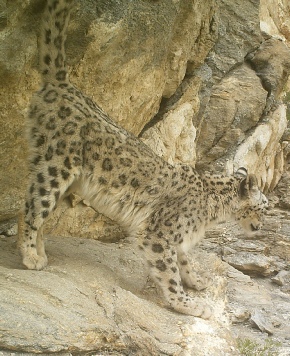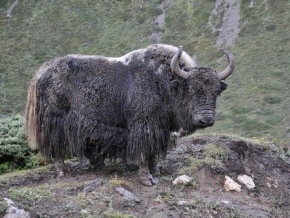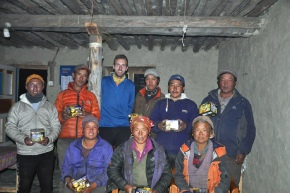This research and conservation project initiated by Georg-August-Universität Göttingen
and co-funded by Breuckmann Foundation addresses the protection of the snow leopard,
a globally threatened felid.
Snow leopards play an important and irreplaceable ecological role at the top of the
food chain in Central Asian high mountain landscapes. However, various anthropogenic
activities in combination with biological factors like large home ranges and low
population densities threaten the survival of this charismatic species. As a consequence,
many snow leopard populations are declining and conservative estimates assume that
only about 3,000 mature individuals are left in the wild. Therefore, the snow leopard
is listed as ‘vulnerable’ according to the IUCN Red List of Threatened Species.
Two main threats to snow leopards are the decline of wild prey and illegal killing
to prevent or retaliate livestock depredation. Due to the growth and expansion of
the human population, the significance of such conflicts between livestock owners
and snow leopards is increasing. However, the causes and suitable mitigation measures
of human-snow leopard conflicts remain insufficiently studied. To fill this gap of
knowledge, the research project aims at identifying suitable mitigation measures
and at initiating and supporting their implementation. This is intended to promote
long-term co-existence between snow leopards and humans and shall benefit both the
situation of local people and the protection of the majestic big cat.
Based on data collected during multiple research stays in the Nepalese Himalaya,
the team of conservation biologists investigates the ecological causes of livestock
depredation by snow leopards and analyses the suitability of various livestock protection
interventions. Moreover, the project supports local livestock owners in the acquisition
and implementation of livestock protection interventions.
After two extensive field stays in the previous year, the majority of research activities
planned in the Annapurna Conservation Area – Nepal’s largest protected area more
than 7600 sqkm – had to be cancelled in 2020 due to restrictions arising from the
COVID-19 pandemic. However, local field assistants managed to conduct about 350 interviews
with livestock owners between July and September 2020. This questionnaire survey
is currently being analysed. Thereof, the scientists hope to gain insights into the
suitability and effectiveness of livestock protection interventions to reduce depredation
of livestock including yaks, goats and horses, and thereby to prevent retaliatory
killings of the threatened big cat. Moreover, a final research is currently taking
place in the Annapurna region (May-June 2021) and is intended to provide essential
data about the main ecological causes of human-snow leopard conflicts.
Moreover, the scientists analysed some of the data collected during the two research
stays in 2019, which yielded interesting findings about the population development
of blue sheep, one of the main prey species of snow leopards in the study area. The
study showed that the local blue sheep population remained at a relatively high level
and that habitat selection of this ungulate was predominantly influenced by ecological
parameters rather than anthropogenic factors like hiking trails and settlements.
The encouraging study results are freely accessible here
https://onlinelibrary.wiley.com/doi/full/10.1002/ece3.6959





